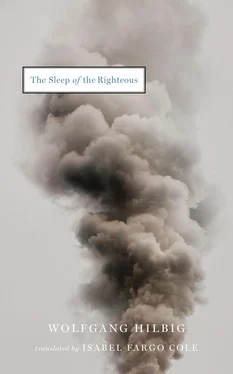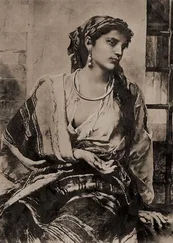That afternoon in Leipzig, as I sat on the edge of her bed, I had sensed that this thin body was now subject to doubt, already in the process of dissipating. More and more it seemed to take on the color of the bedclothes, barely standing out against them. I had tried to encompass this body with my gaze, as though compelled to imprint it on my brain. . How much longer would it be possible to see her? — Below her navel, where the surgical scars made a star shape on her skin, a small wispy patch of light appeared, seeming to circle the wounds, atremble; the afternoon sun cast it through the ground floor window across from her bed. In the next room too, the bedroom where the painter now lived, these flecks of light had often come in the late afternoons. When the sun sank toward the west, its rays broke here and there through the tall dense yew hedge that bordered the yard outside the windows, and for a brief time aimed their vibrating spears at the glass and the curtains. — When this light disappears, so I’d thought, then I’ll go. .
I gazed at her slender white thighs, which were seized now and then by an infinitesimal tremor; Marie said no more, breathing heavily. Her legs were shut, and I saw the small flat pubis, whose hair had always been light and transparent; now it was denuded. — Why hadn’t I gotten up, shut the door before the painter’s eyes, and lain down beside the white body whose contours slowly slipped into nothingness? — There was some incomprehensible darkness inside that had stopped me, and to the end of my life it would fill me with profound regret.
Here too the trip to the mailbox took little more than five minutes if I walked quickly. It led toward the town center, ultimately just an extension of the main street that cut across town from east to west. We had always lived on this street; behind us, a few hundred yards on, the town expired, petering out into the allotment gardens on one side and the ranks and echelons of garages and the premises of small service companies on the other; then the street broke off, splitting into a delta and sinking away into the mud and the stillness. A short way further rose the wooded hills climbed by winding, stepped paths. But you could no longer enter the forest: it had been bought up by the architectural offenders who were erecting their single-family homes behind tall chain-link fences or stockades, Tyrolean or Upper Bavarian travesties with stag’s antlers over the brown-stained wooden balconies. . built with the money they’d made at the ramshackle kiosks that filled every empty lot in town, where the jobless fed on fatty, evil-smelling West German bratwurst and cans of beer from Dortmund and Bremen. With the authorities’ blessing they sawed up the forest and covered it with concrete, and in the vestiges left standing they drilled their attack dogs. — It was the forest of my childhood, and it loomed behind me when I walked to the mailbox, and in the warm time of year on my way back from the mailbox I saw the sky grow light over the last stands of trees. And more and more often in recent years I felt depression shadow me as I returned.
The mailbox is mounted on the front of the so-called “main co-op,” as many of the town’s inhabitants still refer to the building complex. Once it was the largest of the town’s stores; today it has become a rather pitiful chain supermarket with small crammed shelves. The upper floor — the former clothing, stationary, tool, and toy departments, and on the other side facing the courtyard, the administrative office for all the cooperative stores in town and the surrounding area — is vacant, apparently impossible to lease out. Behind the sales building. . in the fifties, before there were self-service shops, Mother had manned the cash register, whose drawer opened with a jingle at the turn of a crank, surrounded by several sales clerks who served the customers under her supervision. . on a side street, beside the entrance to the multistory administrative wing. . whose endless wooden stairs I had to climb to pick up a form to attend the co-op’s children’s camp on the Baltic. . across a granite-cobbled yard looms the hulk of the former industrial bakery, its courtyard surrounded by nineteenth-century façades of dark-red brick, with stone steps outside and ramps with guardrails where the delivery trucks used to line up and load the bread. . so that the whole side street smelled of it, freshly baked, still warm. . and drove off, fully laden, through a massive cast-iron gate: from here the town, the surrounding villages, and the industrial plants were supplied with this chestnut brown, eternally same-tasting foodstuff — a kilo for fifty-two pfennigs. . the bread was of incomparable quality, and it never changed. Now the bakery is empty too, cleared out, abandoned to decay.
Pardon me, could you give me a light?
It is this hackneyed code phrase that startles me from my sentimental thoughts, far too trite to convey to me what it stands for: imminent danger!
I give him his light, and the lighter, which I have to click several times, illuminates his face; a face between fifty and sixty, the age at which you try once again to lose weight, because the mellowing effect fat has on the face is gradually wearing off. But you won’t look striking again, merely wrinkled, and a stubbly beard, generally gray-white, heightens the impression of something aimless and unformed. Little gray eyes, eternally on the lookout: Don’t worry, we’re alone, no one will disturb us. . I’d rather I could hide in a throng of people — a crowded pub, for instance — all at once the square seems bleak and much too large: like a square in a dream whose edge, however fast you walk, you’ll never reach in time, and may never reach again. Dawn is breaking, it grows brighter and brighter; that too is repugnant.
You’ll have guessed right off who you’re dealing with, eh?
I say nothing at all; off the phone he’s still speaking that High German he’ll never really learn. But he no longer speaks it with such fastidious reserve; there’s an oafish familiarity in his injections of dialect. — What does this bastard want from me, with his bad conscience written all over him? I think. Of course I know this can take a different turn quite quickly; I’m curious how he’ll start chipping away at my conscience, they learned that at their so-called Firm .
How long will you be staying? he asks me amiably. Getting away from it all for a few days, eh? Visiting the old homeland again. .
Old homeland, that’s reactionary language! That’s the sort of thing you always accused the radical Bonn imperialists of, I say.
Oh! Do you suppose I ever dealt with that — language usage? What do you think we were doing the whole time? We didn’t have time to kill with language usage. Although. . sometimes I’d rather have had that to deal with. You’d be surprised how much alike we would have been.
Us. . alike, okay! Why don’t you explain to what I owe this honor. I know, back then you didn’t have to, but times have changed. Fortunately for me, unfortunately for you!
True, times have changed. . He opens his eyes wide as though he’s only just realized it. . What do I want? Well, nothing, there’s nothing I can want anymore. But I’d like to take a stroll around the block with you and tell you something. Something about myself, if you’re interested. — He lights a new cigarette from the glowing butt; a heavy smoker, as I’d suspected.
I don’t want to hear it, I say. I’m not some Father Confessor. Let’s go our separate ways, I don’t know you and you don’t know me. You’ve done nothing to me, probably not, and I’ll do nothing to you.
You don’t know I’ve done nothing to you, he says.
Come on, let’s drop the whole thing. As you see, I’m the more successful of us two, I’ve got academies falling all over themselves. Now you just let me do my thing in peace, I’m not going to give you any absolution. And certainly not a job reference.
Читать дальше












